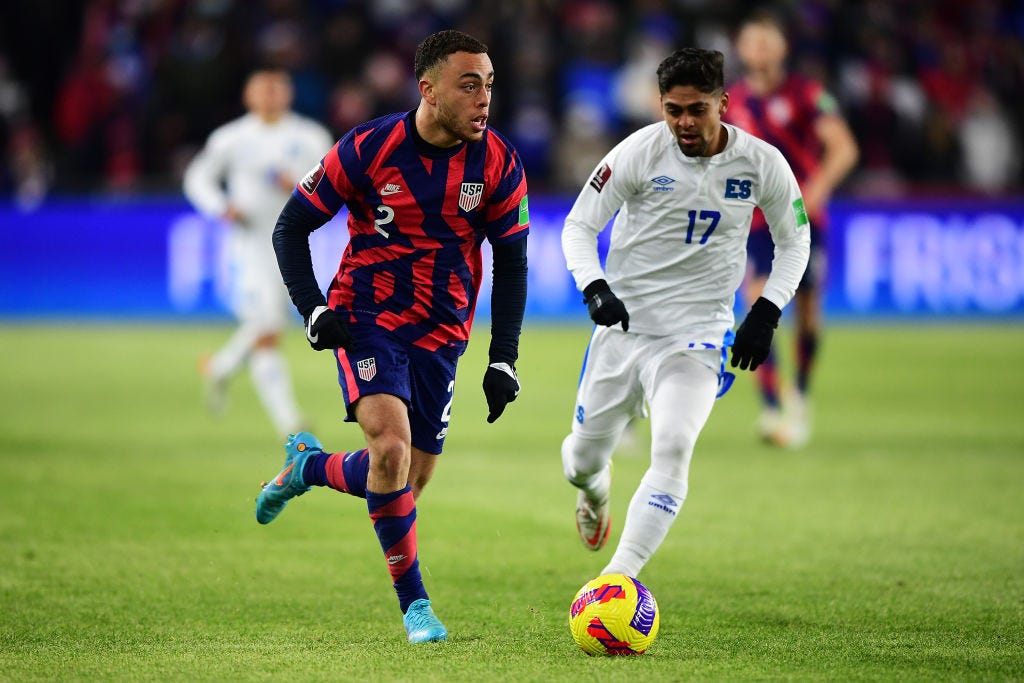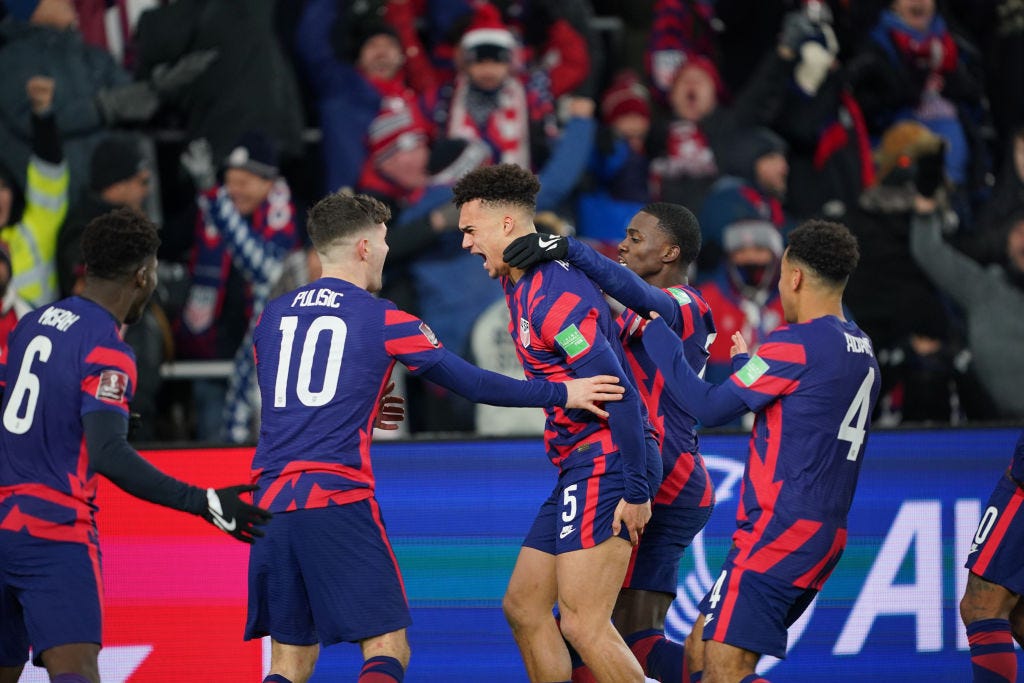Premium: Jedi to the Rescue
Another Robinson Goal Gives a Subpar USMNT Three Huge Qualifying Points Thanks to Its "Superpower" Position: Fullback

COLUMBUS, Ohio — The modern game is a lot of things. It’s high-pressing forwards and pinpoint-passing centerbacks, sweeper keepers and high defensive lines. It’s transitions and set-piece design and the utilization of space and pressure. It’s data analysis, technical and positional mastery, choreographed patterns of play and all about establishing control, control, control.
Nearly every team in the world these days has elements of the above, but one factor that’s almost universal in the modern game is this: outside backs who barrel forward in the attack, giving their teams a width and dynamism that can overwhelm the opposition. A remarkable number of the game’s greatest fullbacks have been Brazilian, from Carlos Alberto to Cafú, Roberto Carlos to Dani Alves, but the Italians have held their own with Giacinto Facchetti and Paolo Maldini.
The U.S. men’s national team hasn’t produced any fullbacks at that level—not yet, anyway—but its hard-fought 1-0 win over El Salvador in Thursday’s World Cup qualifier provided even more evidence that the fullback position has become a source of genuine firepower during the 14-game Octagonal tournament. Left back Jedi Robinson was a constant pest down the flank and in the 52nd minute scored the decisive goal—the Fulham player’s second game-changing strike in qualifying after the one in Honduras last September that sparked a defining comeback victory.
Fútbol with Grant Wahl is a reader-supported soccer newsletter. You can sign up (free or paid) to get my posts in your inbox. Quality journalism requires resources. The best way to support my work is by taking out a paid subscription.
The crucial three points on Matchday 9 left the U.S. in second place (18), one point behind next opponent Canada (19) and one ahead of Mexico (17), with Panama in fourth (14) after a loss in Costa Rica. With the top three finishers receiving automatic World Cup berths, there’s still an outside chance that the U.S. could clinch a spot at Qatar 2022 in the next two games this window.
Former U.S. coach Jurgen Klinsmann once famously said, “Anybody can play left back,” but Robinson’s rise as the most reliable and dangerous U.S. left back in years screams a resounding nope. Call it a Jedi mind trick.
Meanwhile, the American right back, Barcelona’s Sergiño Dest, has merely scored the most jaw-dropping goal of the U.S. qualifying campaign (his equalizer against Costa Rica in October, cutting in from distance) while providing equal helpings of what might best be called sauce and cross.
“We call our fullbacks the superpower of our team. And we do that because they produce.” — USMNT coach Gregg Berhalter
Gregg Berhalter is a modern coach. And so it’s perhaps not surprising that he preaches outside-back attacks as an article of faith.
“We call our fullbacks the superpower of our team,” Berhalter said after Thursday’s win. “And we do that because they produce. They give assists and goals. If you look at World Cup qualifying so far, our fullbacks have contributed heavily. Sergiño has a goal and assists. [Jedi] Robinson has goals and assists. DeAndre Yedlin has assists … We put an emphasis on our fullbacks arriving in the penalty box because we know we have that midfield line that’s supporting them and can clean up anything that comes out on the top of the box.”
It was one fullback (Dest) who scored an important goal in Columbus three months ago (with an untied boot, no less), and it was the other fullback (Robinson) who pulled it off on the same field Thursday. The goal came after a sequence started by Weston McKennie’s pass to Tim Weah, who beat his fallen defender and fired a shot that was saved, only for Jesús Ferreira to head the ball to Robinson for a powerful left-footed sweep finish.

Robinson said his positioning in the box was a result of the directions he’d received from the coaching staff. “It can vary game by game,” he explained. “Today Gregg said he wanted me to be really positive and attacking, start high if Christian [Pulisic, the left winger] was inside, run in behind a lot, threaten their back line, get involved with crosses and get to the back post when it’s coming in from the other side. That’s exactly what my goal was, so credit to Gregg for that being a bit of strategy.”
Robinson’s personality has been coming out recently just as much as his attacking characteristics. The 24-year-old celebrated his goal as he always does, by doing handsprings, but added an element by briefly faking a hamstring injury limp and then dramatically emerging unscathed. “I didn’t tell anyone, so there were a few people scared,” he said, “but it’s all part of the fun of enjoying the game for me.”
The English American added that he prefers not to be called by his formal first name, Antonee, but rather by the name he grew up with. “I’ve been called Jedi since I was five,” he explained. “That’s purely because when I was really young, I was a big Star Wars fan. I used to love getting the costumes, the games, dressing up, watching the movies. Ever since I was that age, I’ve been called Jedi. I’ve introduced myself to people as Jedi: school teachers, new friends. That’s why it’s on my Instagram and Twitter. I feel weird being called Antonee. I prefer being called Jedi.”
So Jedi it is. All things considered, Robinson brought a bit of quality and mirth to a night that didn’t have much else going for it. These three points were a means to an end, and if the U.S. performance was lacking in several regards, at least they knew it.
“I wouldn’t say this was our best game,” Berhalter said. “We didn’t finish enough of our chances that we had. I didn’t think our press was connected as it needed to be. And you could see that we were away from each other for a while, the majority of the group. But … we had enough chances in the first half to score goals … We could have been up 1-0 or 2-0. And we weren’t. When you have an expected goals of 2.5 or something like that, you’re doing pretty well in a game. You also have to give El Salvador credit because those guys fought … Now it’s time to regroup and come up with the plan to attack Canada.”
A lot of soccer analysis is about what we’re seeing on the field, obviously, but another significant part involves noticing what isn’t happening in a particular moment or over a period of time—and how that absence is influencing performances and results. Heading into the El Salvador game, the U.S. had been hurt by a few notable elements that had gone missing, to wit:

• Set-piece success. One of the hallmarks of good USMNT outfits over the years, including under Berhalter, has been making the most of set-piece opportunities at the attacking end and snuffing them out on the defensive end. In the U.S.’s two victories over Mexico in finals in 2021—at the Nations League and Gold Cup—all four U.S. goals came off set-pieces, and defensively the U.S. conceded no goals on restarts.
But that advantage changed completely during the first eight games of World Cup qualifying. From the moment Miles Robinson failed to reproduce his Gold Cup final winner and convert a gift-wrapped set-piece header just six minutes into the opening game at El Salvador in September, the U.S. had been poor on ball delivery, execution and finishing on set-pieces, failing to score a single goal. Potentially dangerous free and corner kicks, whether delivered by Brenden Aaronson, Pulisic or Kellyn Acosta, often haven’t even cleared the first defender. Meanwhile, the difference-maker in the ugly loss at Panama in October came when the U.S. conceded on a corner-kick header.
“I think our big concern is just the overall plus-minus number [on set-piece goals],” Berhalter said on Wednesday when I asked him about the U.S.’s deadball issues in qualifying. “Right now we’re minus-one on set-pieces. So that is a concern. We want to be in the green. We want to be positive in that. We think we have a strong team in the air. We think we have a strong team on offensive set-pieces. And we’ve proven that. So we know we have it in us, and we just need to execute a little bit better on the offensive end. Defensively, I think we’ve been fine. We’ve been solid. We haven’t given up much.”
• Penalties. Spot kicks are technically set-pieces, but it’s worth noting that the U.S. now hasn’t earned a penalty in any of the nine qualifiers—or, for that matter, in 17 games since Gio Reyna converted against Costa Rica in a 4-0 friendly win on June 9. (That said, the U.S. hasn’t conceded any penalties in qualifying, either.)
Two of the lasting USMNT images of 2021 came on penalty kicks: Pulisic’s game-winner against Mexico in extra-time of the Nations League final, and goalkeeper Ethan Horvath’s spot-kick save on Andrés Guardado afterward to preserve the victory. One of Berhalter’s stated goals for the U.S. in attack is to unbalance defenses with speed, ball movement and unpredictability, but qualifying had yet to see the U.S. earn any penalties from attackers cutting in from the wing on the ball and forcing opponents into bad tackles. Which brings us to:
• Star-player combinations. The U.S.’s World Cup qualifying performances have perhaps been better than expected considering the team’s three best players—Pulisic (the player most likely to draw a penalty), McKennie (the one most likely to score on a set-piece) and Tyler Adams (the true indispensable Yank)—had barely been on the field together during the first eight games. Due largely to Pulisic’s Covid and injury absences and McKennie’s three games of suspensions (two for team discipline and one for yellow card accumulation), the trio had played together in qualifying for just the final 21 minutes against Mexico. Not coincidentally, the U.S. was at its best in qualifying during those 21 minutes, scoring both goals (one by Pulisic, one by McKennie) in a deserved 2-0 victory.

Just as the MMA midfield (McKennie, Yunus Musah and Adams) is far and away the best U.S. combination in the center of the park, the U.S.’s road MAP (McKennie-Adams-Pulisic) is a group that when present should allow the Americans to compete toe-to-toe at important positions with just about any team that will be at the World Cup in Qatar.
All three were finally on the field together at the opening whistle on Thursday night. “I’ve known these guys for a long time, so we’re very excited to be in camp together,” Pulisic said the day before the game. “Any time that we can be on the field together is an exciting thing. I think we all enjoy it a lot, so people can look forward to it. Just having a full healthy team and as many guys available as possible is only going to help us in this process.”
Adams was just 15 when he joined McKennie and Pulisic at U.S. Soccer’s residency program in Bradenton, Fla., in 2014. He was playing up a year from his age group, and the three hit it off early. Now they’re the core of the USMNT.
“They’re like my brothers,” Adams told me. “They’re people I talk to on the regular about just daily things, things that don’t even involve football. When you want to laugh, you can FaceTime each other. When you want to play video games, you can play with each other. They’re truly people I can rely on for things. When you have this real type of relationship off the field, it just makes playing together on the field more enjoyable. And I think you feel more free when you’re on the pitch. You don’t feel reluctant to try something, because they’re going to have your back. That’s what makes this national team and this young core group of players very special. We just have each other’s backs. We’ve grown up with each other. And I think that will take us a long way.”
McKennie somewhat famously has said that he doesn’t watch soccer on television. But his friend Adams is the opposite, a self-professed soccer nerd who watches games with an obsession. And what Adams had seen recently from McKennie, who has been in the form of his career with Juventus, gave him confidence heading into this window.
‘Right now Weston is scoring goals for fun,” Adams said this week. “So I’m going to hold him to it and put a little bit extra pressure on him that he needs to score some goals now. So every time we get a set-piece and there’s a good delivery, I’m thinking he’s going to score.”
McKennie and Adams played well on Thursday, even if the U.S. failed again to register a set-piece goal or earn a penalty. Pulisic’s performance, however, was more of a concern. He drifted in too centrally from the left wing, frequently lost possession and wasn’t able to create significant chances before being subbed out in the 65th minute..
“Overall, I was happy with Christian’s effort in the game,” Berhalter said. “I think the effectiveness could have been more. It’s just about him finding his top form and really finding ways to get him in front of the goal. Because that’s where he really shines. When he’s in front of the penalty box is when he does his best work.”
Pulisic has brought the heat in big games before, though, and Sunday’s showdown with first-place Canada is, beyond what most of us would have anticipated a year ago, a big game. It can’t hurt, of course, to have a Jedi on your side.






